The Food Safety and Standards Authority of India (FSSAI) has directed all states and Union territories (UTs) to step up surveillance on dairy analogs throughout March, given the festive season. This is in continuation with the ongoing product-specific monthly surveillance drives of FSSAI to tackle food adulteration and ensure compliance with food safety regulations.
Dairy analogs are products that imitate milk or dairy products but are made from non-milk sources such as almonds, soy, or oats. FSSAI aims to prevent food adulteration and mislabelling during the period of increased demand.
“Keeping in view the increased consumption of dairy products during the festive season, the ongoing surveillance will remain focused on Dairy Analog this month,” FSSAI said.
Dairy analogs are not considered milk, milk products, or composite milk products. When standardized milk products are compositionally altered by replacing milk constituents such as milk fat or milk protein with vegetable oil, palm oil, fat, or protein, the resulting product is classified as an analog.
“Given the ongoing concerns about the standards and labeling of Dairy Analog products, as well as their misrepresentation as dairy products, FSSAI has directed all state authorities to conduct rigorous testing and label examinations to ensure compliance with regulations and prevent consumer deception,” FSSAI said.
IndiFoodBev — authentic, impactful and influential
An English-language food and beverage processing and packaging industry B2B platform in print and web, IndiFoodBev is in its third year of publication. It is said that the Indian food and beverage industries represent approximately US$ 900 billion in revenues which implies more than 20% of the country’s GDP. Eliminating the wastage on the farmside can help to deliver more protein to a higher number of the population apart from generating sizable exports. The savings in soil, seeds, water, fertilizer, energy and ultimately food and nutrition could be the most immense contribution that country is poised to make to the moderation of climate change.
To improve your marketing and grow sales to the food and beverage processing and packaging industry, talk to us. Our research and consulting company IppStar [www.ippstar.org] can assess your potential and addressable markets in light of the competition. We can discuss marketing, communication, and sales strategies for market entry and growth.
Suppliers and service providers with a strategy and budget for targeted marketing can discuss using our hybrid print, web, video, and social media channels to create brand recognition linked to market relevance. Our technical writers are ready to meet you and your customers for content.
The second largest producer of fruit and vegetables in the world is continuously expanding processing capacities and delivery systems with appropriate innovative technologies. We cover product and consumer trends, nutrition, processing, research, equipment and packaging from farm to thali. Get our 2025 media kit and recalibrate your role in this dynamic market. Enhance your visibility and relevance to existing markets and turn potential customers into conversations. Ask for a sample copy of our bi-monthly in print or our weekly IndiFoodBev eZine each Wednesday.
For editorial info@ippgroup.in — for advertisement ads1@ippgroup.in and for subscriptions subscription@ippgroup.in
Naresh Khanna – 10 February 2025
Subscribe Now











